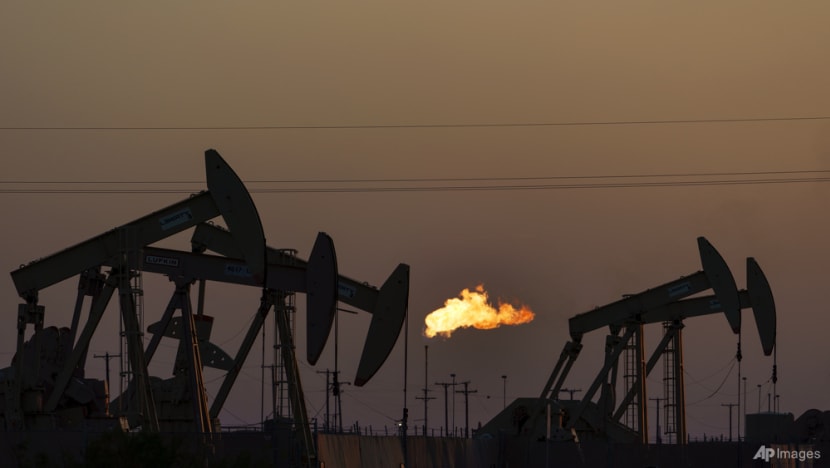Need for separate global treaty on methane, says climate expert ahead of COP27
The ocean, which is an important part of the climate, will also be discussed at the COP 27 summit, but ocean conservationist Fabien Cousteau says there is a need to move beyond debate.

A flare burns off methane and other hydrocarbons as oil pumpjacks operate in the Permian Basin in Midland, Texas, Tuesday, Oct 12, 2021. (AP Photo/David Goldman)
SINGAPORE: Methane emissions are a “key” issue that has not received enough attention, and there is a need to do more to cut them, an environmental expert said ahead of climate summit COP27.
“I believe we need a separate global treaty on methane because cutting methane is the key to reducing near-term temperatures and therefore limiting these extreme weather events and climate change impacts that are hurting economies, public safety, and national security around the world,” Mr Paul Bledsoe told CNA’s Asia First on Friday (Nov 4).
The adjunct professorial lecturer at the Center for Environmental Policy at American University said “there is a lot of work to do”.
Mr Bledsoe, who is also president of a strategic public policy firm specialising in tax policy, energy, natural resources and climate change, said he will be calling for such a treaty at COP27, which will take place from Nov 6 to 18 in Egypt.
For methane emissions to decrease “dramatically”, coal has to be eliminated within the next 20 years and be replaced by natural gas, he said. Natural gas, while not harmless, is considered the cleanest form of fossil fuels.
CHINA’S ROLE
Mr Bledsoe pointed to the need for China to move away from the use of coal, noting that the country uses half of the world’s coal today. China is also key in reducing overall global emissions, given that it is responsible for almost a third of global emissions and more than the entire developed world combined, he said.
“It's time to put pressure on China to cut its emissions because without that we cannot reduce overall global emissions,” he said.
While China has put in place ambitious green plans, its continued reliance on fossil fuels has sent mixed signals about its clean energy transition.
Mr Bledsoe said that it is unfortunate that China has withdrawn from bilateral negotiations with the United States on climate change.
“I believe that all nations in Egypt next week need to call on China to re-engage with not just the United States, but with the global community,” he said.
PRIVATE SECTOR INVESTMENTS
Speaking about climate reparations, which have been cause for debate on who has to pay, Mr Bledsoe pointed to private sector investments as a solution.
The US$370 billion commitment to incentives and funding under the US’ first climate bill is expected to attract trillions of dollars of private sector investment, he said.
The world needs the private sector to begin to make “very large commitments for investments in clean energy and climate resilience and adaptation in the developing world,” Mr Bledsoe added.
“Ultimately, it's private sector investment in clean energy that is really going to tip the scales and reduce emissions quickly,” he noted.
He added that the major banks around the world and financial institutions have a large responsibility as well.
PROTECTING THE OCEAN
Among the discussions that will take place at COP27 - which is happening against the backdrop of multiple climate-driven disasters and record-high temperatures - will be the importance of the ocean, seen as a key defence against the climate crisis.
According to UNESCO, the ocean, which covers 71 per cent of the globe, is a critical part of Earth’s climate and holds a wealth of opportunities to help solve many of humanity’s most pressing challenges, including climate change.
In a very short amount of time, people have changed the ocean’s ecosystem, which is also “the support system that we all depend on for everything from the food sources to the very air that we breathe and that's quite alarming”, ocean conservationist Fabien Cousteau told CNA.
It is time to move beyond talk, he said.
“We've lost a lot of time in these discussions in these debates, and it's now time for action,” he said, adding that the global community knows what the problems are, and to an extent, how to solve them.
“The worst thing we can do is not do anything and have more debates.”
He urged countries to take the first steps to address ocean health, adding that they need to generally look at three topics. They are: climate change and all its related issues, the overconsumption of the world's oceanic resources and the pollution issue, which is illustrated typically by plastics but also includes chemical runoffs that are “quite literally choking our life support system, the ocean”, he said.
NEED FOR COLLABORATION
Given that countries may push blame and responsibility for what happens to the borderless ocean, Emeritus Professor Chou Loke Ming from the Reef Ecology Lab at the National University of Singapore said that there needs to be more cooperation among neighbours.
He pointed to inter-governmental organisations as an answer.
“They come together, agree on what kind of measures should be adopted, and then this would then be implemented in different countries. And I can say that some of these intergovernmental organisations have been quite successful in at least trying to ramp up management of the marine area,” he told CNA’s Singapore Tonight on Thursday.
There are also examples from the region where things have been “turned around”, he said, although he did not elaborate. No one country can manage the waters alone, he added.
“The seas would transfer, transport, all kinds of materials across international boundaries. So, the need for collaboration is very strong, very high,” he said.
















